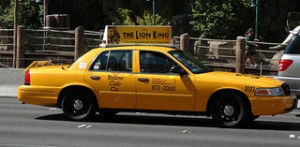Taxi Tipping and the Principal-Agent Problem

(Photo: Spider.Dog)
A reader named Matt Hasten writes in to say:
While in Las Vegas last week for a convention, I took a taxi between casinos (might as well see a few while making my contribution). When it came time to pay and I pulled out a credit card, the cab driver informed me that using a credit card would mean paying a $3 fee in addition to the fare ($11.50). This struck me as a ridiculously high surcharge and when it came time to tip the cab driver (all of this using the back seat electronic card reader), I did not add anything extra. My logic was that while I usually tip 20% on cab fare, that would have only been $2.30 and I already was paying $3 above the fare.
I explained to the cab driver that the money I would usually spend tipping him was instead paying for the $3 fee the cab company imposed on me. The cab driver, understandably, saw things differently and had some colorful wishes for the remainder of my evening. At the time, I felt justified not tipping because I felt the only way to make my displeasure known about the fee was to stiff the cab driver and hope his (and other cab drivers’) anger of missing out on tips might put pressure on the cab company to change the policy. In hindsight, I do feel bad about stiffing the driver! I’m the kind of guy where you have to really mess up to earn less than a 20% tip at a restaurant.
I know the driver didn’t set the $3 credit card fee, but taking it out on him by not tipping was the only way I saw to make my displeasure known or, better yet, impact a greedy policy.
Was I right to not tip?
Interesting question. But, Matt, you’re asking us if you were “right”? By now you should know that Freakonomics is not very strong in the right-vs.-wrong department 🙂
Anyway: I can see Matt’s point of view. I can also see the driver’s point of view. As Matt further noted, the $3 surcharge has been controversial for a while in that it seems to be a back-door profit center for the cab companies, with much of the money not going to the credit-card companies (or the drivers) but rather to the cab companies themselves. From a 2011 Sun article:
Credit card companies said they were unaware of the surcharge until recently, when the politically active taxicab companies began pushing for the bill’s passage.
The Assembly approved the bill earlier this session with minimal opposition. But it is beginning to draw some resistance.
“It’s exorbitant,” said Michael Hillerby, a lobbyist hired by MasterCard. “Nothing we’ve seen justifies that charge.”
William Uffelman, president and CEO of the Nevada Bankers Association, said: “There’s good public policy, then there’s self-serving efforts. This is a self-serving effort.”
The average Las Vegas cab fare last year was $13.52, according to the authority. The $3 fee works out to an average 22 percent surcharge.
But let’s get back to Matt’s situation. Indeed it is tricky. Why? Because he has encountered what economists call the “principal-agent problem.” This means that two parties who seemingly have aligned incentives in fact do not. In this case, the cab company (the principal) would like the driver (the agent) to carry out a strategy that works well for the company, but the driver finds that such a strategy goes against his own interests.
We offered an example of this problem in SuperFreakonomics: city officials and police bosses would like street cops to crack down on prostitution but in fact the cops themselves didn’t have a very strong incentive to do so — which is why, as a Levitt-Venkatesh study showed, “a prostitute [in Chicago] is more likely to have sex with a police officer than to get officially arrested by one.”
While Matt’s reasoning makes sense — “I know the driver didn’t set the $3 credit card fee, but taking it out on him by not tipping was the only way I saw to make my displeasure known or, better yet, impact a greedy policy” — from his point of view, of course it doesn’t help the driver, who’s getting squeezed between the customer and the company.
What would you do if you were Matt?
One thought: suggest to the driver that he set up his smartphone to take credit-card payments, cutting out the cab-company middleman.
Better ideas?

Comments